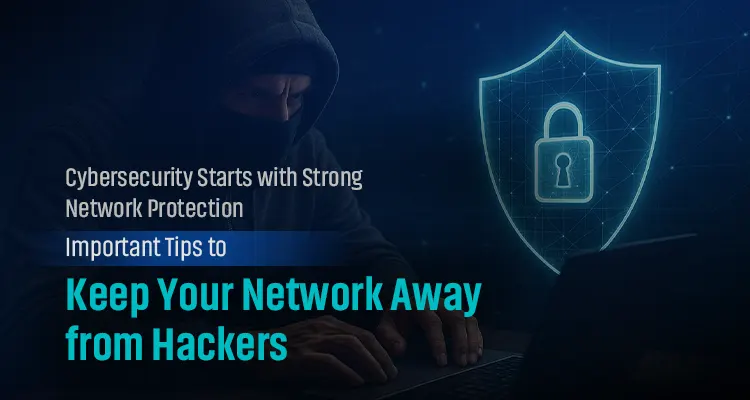How to Secure Your Network Against Hacking

Networking devices like routers, switches, firewalls, and access points form the foundation of any connected environment. In the Kingdom of Saudi Arabia, where digital transformation is accelerating across industries, these devices play a crucial role in enabling communication, data sharing, and business operations. But as networks grow, so do the risks. Without proper security measures, even a single unprotected device can become an entry point for hackers.
Securing your network infrastructure is essential to protect sensitive information, ensure business continuity, and comply with evolving cybersecurity standards. In this blog, we will explore practical steps to secure your network against hacking, focusing on proven methods that work effectively in the KSA context.
1. Use a Firewall
Install a firewall on your devices to prevent your networking systems from being hacked. A firewall serves as the primary defense system for your network, monitoring and controlling both incoming and outgoing traffic, and preventing unauthorized access in accordance with your organization's security policies. It is one of the most effective network protection devices that every organization should need. It also prevents malware from your devices, ensuring the most possible security. From choosing a firewall to securing it by assigning access to authorized personnel, classifying zones, and firewall care, the effort you put in will be an asset for secured features. You can choose the best firewall from top brands like SonicWall and Fortinet.
2. Install Anti-Malware and Antivirus Software
Anti-malware and antivirus software are essential tools that detect, block, and eliminate malicious threats such as viruses, spyware, ransomware, worms, and trojans. These threats can enter your network through email attachments, unsecured websites, USB devices, or even outdated software. By installing reputable security software across all computers, servers, and endpoints, you add a strong layer of defense that continuously monitors for suspicious activity. For maximum protection, it’s also important to ensure your servers are properly secured and updated, as they form the backbone of your IT infrastructure. Learn more about choosing and maintaining the right servers for your business in KSA. Regular updates and real-time scanning features ensure that even newly emerging threats are identified and stopped before they can cause damage to your system or compromise sensitive data.
3. Apply Encryption
End-to-end encryption (E2EE) is a crucial security measure that ensures data shared across your network remains private and accessible only to authorized users. It works by encrypting data at the source, whether it is employee-to-employee or business-to-business communication, so that even if intercepted, the information cannot be read without the correct decryption key or password. This level of protection applies to data both in transit and at rest, safeguarding everything from internal messages to stored files. Implementing secure protocols such as HTTPS, SSL/TLS, and WPA3 for Wi-Fi further strengthens encryption, making it much harder for hackers to exploit your network. Encryption is especially vital in high-risk sectors like finance, healthcare, and education, where data sensitivity is non-negotiable.
4. Use Strong Passwords
Strong passwords are a critical defense against unauthorized access and cyberattacks. Weak or predictable credentials can expose your entire network to serious risks. Avoid using default usernames, personal details like names or birthdates, or easily guessable patterns. Secure logins should never include email addresses, phone numbers, or social media-based information. Instead, encourage passwords with at least eight characters, mixing uppercase and lowercase letters, numbers, and special symbols. In addition, enable two-factor authentication (2FA) wherever possible to add another layer of security beyond just a password.
5. Proper Network Monitoring
Effective network monitoring involves continuously tracking the health and activity of your network devices, including routers, switches, servers, and endpoints. It helps to detect any unusual behavior or potential threats. By using advanced network monitoring tools, businesses can identify bottlenecks, unauthorized access attempts, or malware activity in real time. Regular monitoring also helps in proactive troubleshooting, reducing downtime, and ensuring that your systems are running smoothly. In environments like schools, hospitals, or offices, where sensitive data is handled daily, a well-monitored network is crucial to prevent breaches and maintain compliance with cybersecurity standards.
6. Set Up VPN
A Virtual Private Network (VPN) is one of the most effective tools for securing data transmission over the internet. It creates an encrypted tunnel between your device and the network, making it difficult for hackers or third parties to intercept sensitive information. This is especially useful for remote employees, multi-branch organizations, or teams accessing internal systems over public or unsecured networks. For even greater security, combine VPN usage with firewalls and endpoint protection to build a multi-layered defense around your network.
Network security is not just about having strong passwords or installing antivirus software, it is about building a secure, multi-layered environment where data flows safely, threats are detected early, and access is always controlled. By implementing the best practices discussed, you can significantly reduce the risk of hacking and protect your digital operations.
Start with the right strategy, use the right devices, and partner with trusted experts like InfomeKSA to keep your network secure and future-ready. At InfomeKSA, we offer the best networking devices and expert support to keep them away from hackers and other cyber threats. For businesses in UAE, our headquarters in Dubai offers the best networking devices in UAE of top brands. Contact us today.






